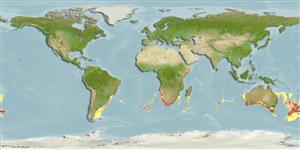Preferred temperature (Ref.
115969): 4.1 - 16.4, mean 7.5 (based on 485 cells).
Phylogenetic diversity index (Ref.
82804): PD
50 = 0.5156 [Uniqueness, from 0.5 = low to 2.0 = high].
Bayesian length-weight: a=0.00891 (0.00498 - 0.01595), b=3.10 (2.94 - 3.26), in cm Total Length, based on LWR estimates for this species & (Sub)family-body (Ref.
93245).
Mức dinh dưỡng (Ref.
69278): 4.0 ±0.57 se; based on food items.
Thích nghi nhanh (Ref.
120179): Trung bình, thời gian nhân đôi của chủng quần tối thiểu là 1.4 - 4.4 năm (K=0.03-0.3; tm=5-7; tmax=15).
Prior r = 0.57, 95% CL = 0.38 - 0.86, Based on 3 data-limited stock assessments.
Fishing Vulnerability (Ref.
59153): Moderate to high vulnerability (51 of 100).
Climate Vulnerability (Ref.
125649): Moderate to high vulnerability (52 of 100).
